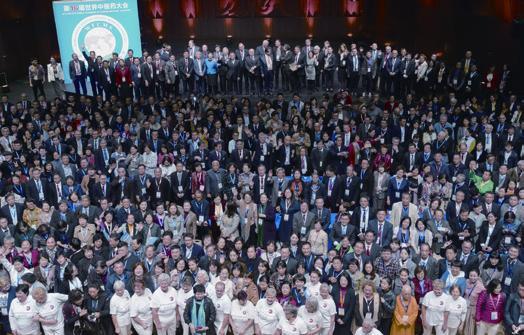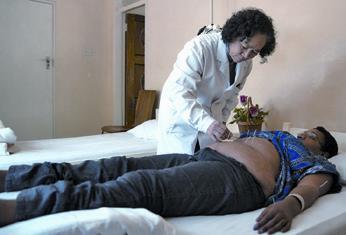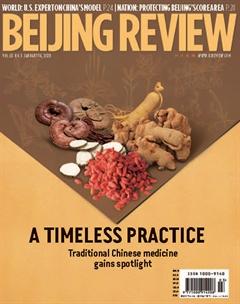GETTING THE POINT
By Derrick Silimina
Anita Njobvu, who lives in Zambias capital Lusaka, was introduced to acupuncture therapy by her husband because her blood pressure was dangerously high. The treatment used to be rare on the African continent, but with growing awareness in countries like Zambia, an increasing number of patients are opting for the healing technique rather than conventional medicine.
“I was first introduced to Chinese herbal medicines and later ended up having acupuncture treatment, which has been helpful since my blood pressure has actually stabilized,” said Njobvu.

Acupuncture is an important part of traditional Chinese medicine (TCM) and involves the insertion of needles into specific points on the human body with the aim of restoring equilibrium between a persons physical, emotional and spiritual aspects. Njobvu, who had been battling severe hypertension for some time, said after about three months of acupuncture therapy, she is on the road to recovery.
The growing footprint of TCM in the country is a reflection of China-Zambia relations, highlighting cooperation in a wide range of areas, including healthcare.
Popular treatment
Traditional and alternative medicine is used and accepted by a great majority of the Zambian population, regardless of ethnic, religious or social background.
“[My TCM doctor] Feng Kehongs treatment took about two months and after the third month, I have not had any high blood pressure readings,” said Njobvu.
Pamela Chisunka, a teacher in Central Province, said compared with conventional medicine, TCM remedies are more effective for the treatment of certain kinds of diseases. “I think Western medicine wouldnt help cure my chronic headaches. It only has a temporary effect because the pain remains when you stop taking the medicine. As a result, you spend more on medication,” said Chisunka.
Benjamin Mambwe, a bus driver in Lusaka, said it wasnt long after he began to receive acupuncture treatment from Feng that he recovered from partial paralysis in early 2019. He told Beijing Review that during the process, the doctor used needles to prick the affected body part.
“You feel a slight discomfort when she starts the process; but afterward, its okay and the pain disappears,” he explained.“After 30 minutes, the needles are removed and the process is repeated [daily] for 10 days.” Since having the treatment, Mambwe is back on his feet, able to carry out his daily duties.
In 1997, Feng came to Zambia as part of a Chinese medical team and worked for two years as a resident doctor first at Ndola General Hospital and then at Kabwe General Hospital in Central Province. Driven by her passion to provide quality healthcare to the people, Feng established Zhong Yi Surgery in Lusaka in 2002, with a focus on TCM care, following an increase in demand for Chinese medical treatments among local residents.
“Since I came to Lusaka, more and more people have come to understand acupuncture. I attend to various patients suffering from strokes, HIV/AIDS, hypertension, paralysis and diabetes, among other conditions,” she said.
Fengs assistant Neila Mumba, from Zambia, explained how the medical facility, located in Lusakas Roma residential area, has helped many Zambians recover from various diseases. “We had a chief from north Zambia who suffered a stroke and was unable to walk. But after [acupuncture] treatment, he was able to walk again. We also have several cases of senior government officials who come here to seek medical attention,” said Mumba. “For instance, there is one lady who is diabetic and had been to several hospitals, but her condition was quite severe and she didnt recover until she came here. Her condition has now improved and her sugar levels have gone drastically down.”
Asked why she has prioritized TCM and not conventional medicine in her private practice, especially since she is a fully qualified doctor who has served in Zambias public hospitals, Feng said her calling is to help people with the most effective medical care available.
“In China, I learned Western medicine and TCM. I chose the latter after I established the clinic; but before that, I practiced as a full-time conventional doctor,” she said.
Local compliance
Since TCM is built on a foundation of thousands of years of medical practices, it includes various forms of herbal medicine, acupuncture, massage, exercise and dietary therapy, among others. Feng said she has been helping more local people under- stand how traditional therapies work while complying with local rules and standards.

“One big advantage of TCM is that it is easy to perform, and it doesnt have high requirements for medical equipment,”Feng said.
Benjamin Chitumbo, a renowned doctor in the northern city of Ndola in Copperbelt Province, is impressed with his Chinese counterparts and their effective medical practices. “All I know from experience is that acupuncture is one of the alternative medical treatment methods based on a long Chinese tradition and explains the interconnectivity of our hormones and nervous system. Acupuncture has been used for a variety of illnesses. It is certainly a practice that has helped many of my patients,” said Chitumbo.
In line with how TCM adapts to local conditions, the Zambian Government recognizes traditional and complementary/ alternative medicine, while national policies support these treatments. Although there are no official regulations for recognizing the qualifications of practitioners, the Traditional Health Practitioners Association of Zambia reviews and registers traditional practitioners for licensing and plans are underway to develop these regulations.
According to the World Health Organization (WHO), at least 70 percent of Zambians use traditional medicine. Recently, Health Minister Chitalu Chilufya said the government is reviewing the act that governs the practice of traditional medicine. In addition, Zambia is considering better utilization of its diverse medicinal plants, a worthwhile lesson learned from China.
“As we strengthen our health system, we have identified the need to strengthen collaboration, in particular with China. Zambia will strengthen cultivation of medicinal plants and share experiences and knowledge,” said Chilufya when meeting with a delegation from Chinas Jiangxi University of Traditional Chinese Medicine(JUTCM) in September 2019. Zambian President Edgar Chagwa Lungu visited the JUTCM campus in 2018.
Chilufya also hailed the wider partnership between China and Zambia, especially in the area of health infrastructure and professional training. Zuo Zhengyun, head of the delegation and President of JUTCM, told Chilufya that his university had signed a memorandum of understanding with the Tropical Diseases Research Center (TDRC) of Zambia on joint research programs.
Located in Ndola, the TDRC is a biomedical research center initiated by the WHO in collaboration with the Zambian Government. “We also hope to cooperate through research and development to promote clinical use of Zambian traditional herbal medicines,” said Zuo.

